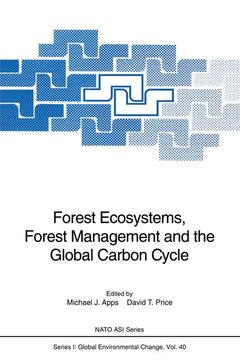Forest Ecosystems, Forest Management and the Global Carbon Cycle, Softcover reprint of the original 1st ed. 1996 Nato ASI Subseries I: Series, Vol. 40
Langue : Anglais

Globally, forest vegetation and soils are both major stores of terrestrial organic carbon, and major contributors to the annual cycling of carbon between the atmosphere and the biosphere. Forests are also a renewable resource, vital to the everyday existence of millions of people, since they provide food, shelter, fuel, raw materials and many other benefits. The combined effects of an expanding global population and increasing consumption of resources, however, may be seriously endangering both the extent and future sustainability of the world's forests. About thirty chapters cover four main themes: the role of forests in the global carbon cycle; effects of past, present and future changes in forest land use; the role of forest management, products and biomass on carbon cycling, and socio-economic impacts.
Foreword.- Preface.- Workshop participants.- 1 Introduction.- I: Forest ecosystems and the global carbon cycle.- 2 The global carbon cycle and the atmospheric record: “The problem definition”.- 3 Nutrient constraints on carbon storage in forested ecosystems.- 4 Estimated extent of forested peatlands and their role in the global carbon cycle.- 5 Sequestration of carbon in the boreal forest ecosystem managed for timber production: the situation in Finland.- 6 Carbon storage and climate change in Swedish forests: a comparison of static and dynamic modelling approaches.- 7 Climate change and management of insect defoliators in boreal forest ecosystems.- 8 Some potential carbon budget implications of fire management in the boreal forest.- 9 Working Group Summary: Natural and anthropogenically-induced variations in terrestrial carbon balance.- II: The global carbon cycle and forest land use: past, present and future.- 10 Land-use change and terrestrial carbon: the temporal record.- 11 Tropical forests and the global carbon cycle: estimating state and change in biomass density.- 12 Carbon budget of the Russian boreal forests: a systems analysis approach to uncertainty.- 13 Conflicting objectives while maximising carbon sequestration by forests.- 14 Retrospective assessment of carbon flows in Canadian boreal forests.- 15 The carbon pulse resulting from forest dieback related to insect outbreaks: case study of a forest district in the Sudety Mountains (southwest Poland).- 16 Carbon budget of temperate zone forests during 1851-2050.- 17 Working Group Summary: Forests and the global carbon cycle: past, present and future role.- III: The global carbon cycle, forest products and forest biomass.- 18 Carbon implications of forest management strategies.- 19 The influence of carbonbudget methodology on assessments of the impacts of forest management on the carbon balance.- 20 Significance of wood products in forest sector carbon balances.- 21 Plantation forestry—its role as a carbon sink: conclusions from calculations based on New Zealand’s planted forest estate.- 22 Carbon pools and fluxes in U.S. forest products.- 23 Effects of forest management, harvesting and wood processing on ecosystem carbon dynamics: a boreal case study.- 24 Working Group Summary: Evaluating effects of alternative forest management regimes on the role of forests and forest products in the carbon cycle.- IV: The human dimension: the global carbon cycle and socio-economics.- 25 The economics of increased carbon storage through plantations and forest management.- 26 Costs of forest-sector mitigation options.- 27 Integrating the socio-economic and physical dimensions of degraded tropical lands in global climate change mitigation assessments.- 28 Socio-economic factors in the management of tropical forests for carbon.- 29 Economic aspects of carbon sequestration—some findings from Norway.- 30 People and forests in Canada: fitting carbon into a perplexing future.- 31 Forests and global carbon management: a policy perspective.- 32 Working Group Summary: Human dimensions of the forest-carbon issue.- Concluding remarks.- 33 Summary.- 34 Epilogue: Forests and the human habitat: the case for building a global consensus.- List of acronyms and abbreviations.- List of reviewers.- Author index.
Date de parution : 07-2012
Ouvrage de 452 p.
15.5x23.5 cm
Disponible chez l'éditeur (délai d'approvisionnement : 15 jours).
Prix indicatif 105,49 €
Ajouter au panierThèmes de Forest Ecosystems, Forest Management and the Global... :
© 2024 LAVOISIER S.A.S.



